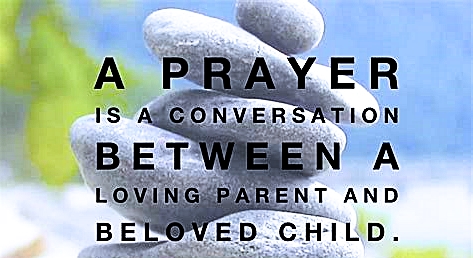Conversational Prayer – BT11

Drawing-near, conversational-prayer includes more child-like confidence but also humility and thankfulness
Please follow the BLOG Etiquette to stay on topic and pass the moderator’s check. Bold, underlined text below = future links to the BLOG pages.
Proseuche conversational-prayer is also more like the Greek noun enteuxis, meaning “an attitude of child-like confidence, trust, boldness, and free approach to God that can then boldly intercede for others,” but it’s used only 2 times in the NT: The OT dietary Laws and Traditions of the Elders were unnecessary because “everything created by God is good, and nothing is to be rejected if it is received with eucharistia thanksgiving, for it is made holy by the gospel logos message of God and [also] by enteuxis confident-approaching-prayer” (a). Paul also tells Timothy “[I strongly-urge-you] that deesis supplication, proseuche conversational-prayers, enteuxis confident-approaching-intercessions, [and] eucharistia thanksgiving be made on-behalf-of all people, for kings and those in high positions, that we may lead a eremos ‘undisturbed, placid, tranquil, composed’ and/coupled hesuchios ‘still, quiet, calm, steady, settled’ life” (b). Notice again that the monologue of deesis supplication is distinct from proseuche conversational-prayer, intercession, and thanksgiving? How easily we confuse them because so often our English bibles don’t differentiate them! <Notes> a) 1 Timothy 4:4-5, b) 1 Timothy 2:1-2.
Proseuche conversational-prayer is also more like the Greek noun hiketeria, meaning “an attitude of lowliness/humility or self-deprecation when approaching God for favor, as with holding out an ‘olive branch’ to signal an approach for supplication,” used only 1 time in the NT: During Christ’s life, He offered both deesis supplications and/coupled hiketeria ‘lowly/humble requests for favor’ with loud crying and/coupled tears to the One [Father-God] who was able to save Him from death and/coupled having been deeply-heard because of His eulabeia ‘reverently-grabbing of what is good, thus devout caution,’ even though being a Son, He learned this hupakoe ‘surrender to what is akouo heard/listened-to-understand/know from the things He suffered (a). We, too, can be “deeply-heard because of our eulabeia ‘reverently-grabbing of what is good, thus devout caution’ in our lowly-approach to God for favor. <Notes> a) Hebrews 5:7-8, b) Philippians 2:8, c) Matthew 23:12; Luke 14:11, 18:14, d) Matthew 18:4.
Other words for lowering/humility are the noun/verb tapeinos/tapeinoo of Jesus “tapeinoo lowered/humbled Himself by becoming submissively-obedient to the point of death, even death on a cross” (b). Thus Jesus taught that “whoever tapeinoo lowers/humbles himself will be exalted” (c) and similarly that “whoever tapeinoo lowers/humbles himself like this little child is the greatest in the kingdom of heaven” (d). James groups the phrases “God gives unconditional-loving-favor-of-grace to the tapeinos lowly/humble” and “hupotasso ‘assign, put in order/appoint under as with a ‘military’ post/duties’ yourselves therefore to God” and “tapeinoo lower/humble yourselves before the Lord, and He will exalt you” and associates all this to “eggizo ‘draw extremely close’ to God kai and/then He will eggizo ‘draw extremely close’ to you” (e). <Notes> a) Hebrews 5:7-8, b) Philippians 2:8, c) Matthew 23:12; Luke 14:11, 18:14, d) Matthew 18:4, e) James 4:6-10.
Proseuche conversational-prayer is also more like the Greek noun eucharistia, meaning “an attitude of gratitude and thankfulness expressed chiefly through prayer,” used only 15 times in the NT: In Paul’s final instructions to the Colossians, he strongly urges them to “be presently/ongoingly proskartereo persistently-relationally-devoted-toward (a) proseuche conversational-prayer, routinely gregoreo vigilantly-watching (b) in it with with eucharistia thanksgiving” (c). We saw above that Paul tells Timothy “[I strongly-urge-you] that deesis supplication, proseuche conversational-prayers, enteuxis confident-approaching-intercessions, [and] eucharistia thanksgiving be made on-behalf-of all people, for kings and those in high positions, that we may lead a eremos ‘undisturbed, placid, tranquil, composed’ and/coupled hesuchios ‘still, quiet, calm, steady, settled’ life” (d). Also to Timothy that the OT dietary Laws and Traditions of the Elders were unnecessary because “everything created by God is good, and nothing is to be rejected if it is received with eucharistia thanksgiving, for it is made holy by the gospel logos message of God and [also] by enteuxis confident-approaching-prayer” (e). <Notes> a) proskartereo: “pros towards-and-interacting-with plus kartereo ‘showing of steadfast strength,’ thus to consistently show strength that prevails in spite of difficulties, thus to endure and stay in a fixed direction, continuing to do something with intense effort despite difficulty, and so be persistently-relationally-devoted-to,” b) watching in prayer is the topic of another BLOG, c) Colossians 4:2, d) 1 Timothy 2:1-2, e) 1 Timothy 4:4-5.
Furthermore Paul says, “Therefore, as you received Christ Jesus the Lord, so walk in him, rooted and built up in Him and established in The Trusting-Relying-Faith, just as you were taught, abounding in eucharistia thanksgiving” (a). So Paul strong urges us to: “Be anxious about nothing but through proseuche conversational-prayer and/coupled deesis supplication-prayer [both together] with eucharistia thanksgiving, let your aitema specific-subordinately-asked-petitions be made gnorizo experientially, relationally known to God” (b). Can you see how many forms of prayer can occur together? Concerning un-interpreted tongues in public services, Paul writes: “If you are praising God by the means of the Spirit, how will he who occupies the place of the uninformed (ignorant) say ‘Amen’ at your eucharistia thanksgiving [that tongues must contain] since he does absolutely-in-fact-NOT eido mentally ‘see’ to perceive/know what you say” (c) – see The Grace-Gifts of Tongues & Interpretation? Paul says that those who sow the seed of the gospel logos message are enriching the Corinthian Christians in every way so they call also all be generous to others, especially in their giving, which produces dia thru-the-realizing-channel of us eucharistia thanksgiving to God (d). Paul exhorts Christians to “be imitators of God . . . and/coupled walk-all-around/live in/by/with unconditional-love . . . [I strongly urge you to] absolutely-in-fact-NOT even let be named among you . . . filthiness and/coupled foolish-talking or crude-joking which are absolutely-in-fact-NOT fitting [for saints] but-instead rather eucharistia thanksgiving” (e). <Notes> a) Colossians 2:6-7, b) Philippians 4:6, c) 1 Corinthians 14:16, d) 2 Corinthians 9:11, e) Ephesians 5:1-4.


Leave a Reply